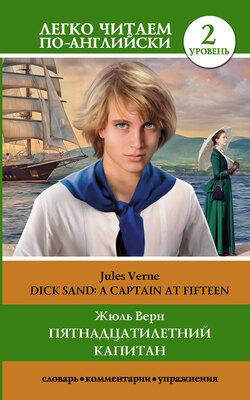Читать книгу Пятнадцатилетний капитан / Dick Sand. A Captain at Fifteen. Уровень 2 - Жюль Верн, Жуль Верн - Страница 5
Part I
Chapter IV
The Survivors of the “Waldeck”
ОглавлениеThe slave-trade[11] is still extensively carried on in all parts of equatorial Africa. Year after year vessels loaded with slaves leave the coasts of Angola and Mozambique to transport their freight to many countries.
Captain Hull knew that very well. He thought that the negroes were the part of a slave-cargo which was on its way to some colony of the Pacific. And he wanted to announce that they regained their freedom on board the “Pilgrim.”
Mrs. Weldon, assisted by Nan and Dick Sand, was doing everything in her power to restore consciousness to the poor sufferers. Fresh water and some food soon helped them. The eldest of them was a man of about sixty years of age. When he regained his powers of speech, he was able to reply in good English to all the questions. In answer to Captain Hull’s inquiry whether they were not slaves, the old negro proudly stated that he and his companions were all free American Citizens from the state of Pennsylvania.
This old man communicated all the information that Captain Hull required to hear, and he related all the details of his adventures.
He said that his name was Tom. When was only six years of age he was brought from his home in Africa to the United States; but he recovered his freedom. His companions, who were all much younger than himself, were all free-born. One of them was his own son; his name was Bat (an abbreviation of Bartholomew); and there were three others, named Austin, Acteon, and Hercules.
Three years ago the five men were engaged by an Englishman who had large property in South Australia. Upon the completion of their engagement they determined to return to America. On the 5th of January, they embarked at Melbourne on board the “Waldeck.” Everything went on well for seventeen days, until, on the night of the 22nd, which was very dark, they were run into by[12] a great steamer. The scene was terrible; both masts were gone, and the brig completely heeled over on its side. Captain and crew disappeared. They were left alone upon a half-capsized and disabled hull, twelve hundred miles from the nearest land.
The boats were crushed in the collision, so that they had to await the appearance of a passing vessel.
For the next ten days the negroes were eating the food that they found in the stern cabin; but they were quite unable to obtain a drop of anything to drink. Tortured with thirst, the poor men suffered agonies. On the previous night they entirely lost consciousness.
All the outlines of Tom’s narrative were fully confirmed by the other negroes.
One other survivor of the wreck was the dog who had an unaccountable dislike to Negoro.
Dingo, as the dog was named, belonged to the fine breed of mastiffs. The animal came from the coast of West Africa, near the mouth of the Congo. The captain of the “Waldeck” get the dog two years ago. The initials S. V. were engraved upon the dog’s collar.
Dingo was very large. It was a magnificent example of his kind. Standing on hind legs, it was as tall as a man. This dog was like a panther. Its fine shaggy coat was a dark tawny colour, its long bushy tail was as strong as a lion’s. If he was angry, no doubt he became a most formidable foe.
Dingo was unsociable, but it was not savage. Old Tom said that, on board the “Waldeck,” Dingo had particular dislike to negroes; it uniformly avoided them.
The five men were profoundly grateful to their kind-hearted benefactors; poor negroes utterly resigned the hope to repay the debt which they owed their deliverers.
11
slave-trade – работорговля
12
they were run into by – на них налетел
